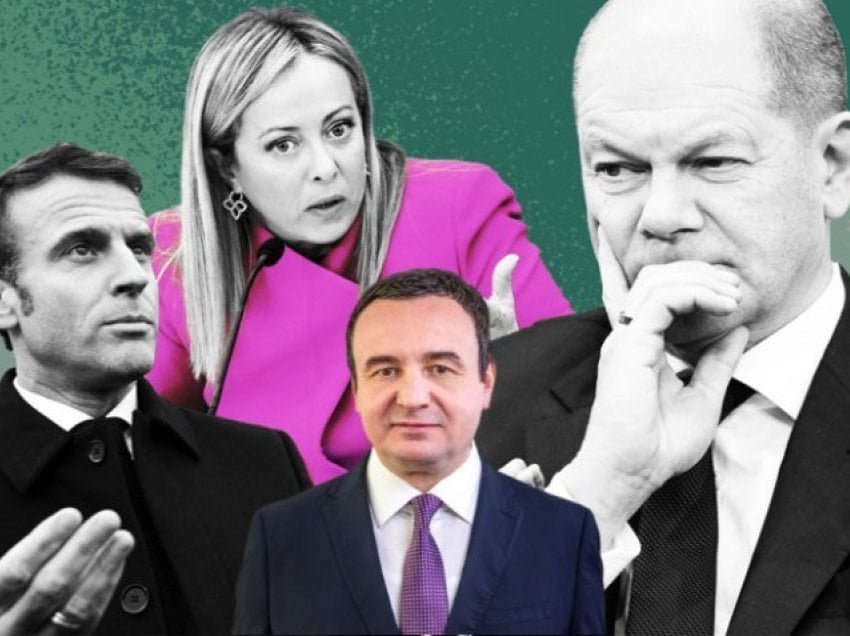The Balkan expert at the Leibniz Institute for East and Southeast European Studies in Regensburg, Konrad Clewing, has stated that the problem with Kosovo’s failed bid for Council of Europe membership lies with key EU member states Germany, France, and Italy.
In an exclusive interview with “Bota Sot” newspaper, the German historian described the precondition set by these three states for Kosovo – the Association of Serb-Majority Municipalities – as unusual in content and style.
According to him, through this condition, the three powerful European governments want to pressure the Kosovo Government regarding the Association, out of frustration over the unfulfilled “duty” taken on in 2013.
Clewing expressed his doubts that the Kosovo Government is preparing the draft statute for the Association of Serb-Majority Municipalities to submit to the Constitutional Court for review. He even emphasized that even if the Government acts, there is little chance that Germany, France, and Italy will accept a draft other than the one by Miroslav Lajčák.
Full Interview:
Bota Sot: Kosovo missed the historic opportunity to join the Council of Europe on May 17, despite the Parliamentary Assembly recommending its membership. Where do you think the problem lay?
Konrad Clewing: The problem can be found with the major EU member states (Germany, France, Italy) that effectively opposed the vote of the CoE Assembly and resisted siding with the Kosovo government. Primarily, Kosovo’s membership was blocked by the discovery of a specific precondition set by the three governments. This precondition was unusual in content and style, as it required another country (i.e., Kosovo) to seek the opinion of its own Constitutional Court for a specific draft not created internally but written by a third party (in this case, Miroslav Lajčák) for a specific internal political issue. This is rare in international relations.
It is clear that the three governments did this because they finally saw a powerful tool to pressure the Kosovo government to act regarding the Association, frustrated for months or even years by the Kosovo government’s delay in fulfilling the agreement and corresponding duty dating back to 2013. This enters the sphere of responsibility of the Kosovo government. Perpetually delaying the whole issue of the Association was a significant mistake of all governments since 2013 or at least since 2015 (the year of the first Constitutional Court decision on this matter). It would have been far more productive to develop a clear strategy for Kosovo on how to establish a constitutional framework for that Association. The lack of this has given space for the current attempt by Kosovo’s key partners to finally dictate a solution. And there is another aspect of the current government’s responsibility: they simply ignored all the clear signals from those European governments that they expected a significant step forward regarding the Association to allow Kosovo into the Council of Europe. The government evidently took every risk, and its last frantic steps to seemingly avoid that failure just before May 17 were far from convincing.
Bota Sot: The Kosovo Government is preparing the draft statute for the Association of Serb-Majority Municipalities to submit to the Constitutional Court for review. Do you think this draft will convince Germany, France, and Italy, who opposed Kosovo’s membership in the CoE without the formation of the Association?
Konrad Clewing: Unfortunately, I find it doubtful whether the government is genuinely working on preparing such a draft statute. For example, the draft statute and a type of Association are also overdue as a symbolic step for the Serbian minority in Kosovo to gain at least some trust in the government. Kosovo Serbs remember Kurti’s promise for dialogue with them before the last elections, but such a dialogue has not effectively materialized. But even if the government now decides to act, for the foreseeable future, there is very little chance that Germany, France, and Italy will relent from their obstruction based on any draft other than the one they themselves propose, which is Miroslav Lajčák’s draft. I assume this will remain the case for a long time, and regardless of Miroslav Lajčák’s imminent replacement.
Bota Sot: Kosovo has hesitated to establish the Association out of fear that it might turn into an entity similar to Republika Srpska in Bosnia. Where lies the risk?
Konrad Clewing: Given the cautionary example of Republika Srpska, such hesitation is undoubtedly very understandable. This is even more true considering (something that European governments usually do not do, unfortunately) how hostile the Serbian government is to Kosovo’s very existence. For Kosovo’s citizens, it is no secret, but it is true: Serbia pursues a revisionist agenda. It tries to undermine Kosovo’s state order and will exploit any opportunity to maintain or strengthen its parallel institutions and presence and influence in Kosovo’s territory. However, in my opinion, this is only another reason why the Kosovo government should have long developed a strategy to genuinely improve a framework of limited local Serbian autonomy within Kosovo’s constitutional framework, beyond Serbia’s control.
Bota Sot: The opposition in Kosovo has continually accused the Government of damaging Kosovo’s relations with the USA. How do you see Prime Minister Kurti’s relations with America and the European Union?
Konrad Clewing: Firstly, I find it quite understandable that Prime Minister Kurti and his government were very dissatisfied with the previous status quo of the “EU-facilitated” dialogue with Serbia and also dissatisfied with the lack of support from Kosovo’s partners to dismantle Serbian parallel state structures within Kosovo. However, having said that, Albin Kurti’s willingness to confront the traditional approach of Kosovo’s partners, of course, needed to be accompanied by better diplomacy and more credibility (and certainly with fewer short-term unilateral actions). In short, the current relations seem to be deeply strained, at least in terms of the overall harsh atmosphere and lack of mutual trust in the goodwill between Kosovo and its partners on both sides of the Atlantic.
Bota Sot: Kurti is considering early elections at the end of his term; why do you think he is taking this step?
Konrad Clewing: From everything I can discern, the current government has not been very successful in its foreign relations or within Kosovo. The only significant exception is the considerable success in the fight against the presence of the Serbian state on Kosovo soil. If it is assumed that external partnerships will not improve soon, nor will there be quick governmental advances to improve the dire economic situation and entrenched political realities within Kosovo, going to elections to at least sell the successes of increasing de facto sovereignty might seem like a reasonable option for the government to stay in power.
Bota Sot: What do you foresee could happen to Kosovo’s fate if Trump comes back to power? Could the idea of Kosovo-Serbia territory exchange resurface?
Konrad Clewing: It is almost impossible to predict the extent of the turmoil that a potential Trump victory could cause for Europe and for the Balkans and Kosovo. It is not necessarily the case that Trump’s possible victory would inevitably end with the strengthening of Serbia’s position and the weakening of Kosovo’s position. But it is also very likely to end this way. Therefore, playing with time should not be an option in Kosovo’s relations with key European partners and the USA.
Bota Sot: How do you view the formation of the Serbian Government, which entirely has two vice presidents on the US blacklist?
Konrad Clewing: Given the very close relationship between Aleksandar Vučić and especially Aleksandar Vulin, the symbolic position given to the latter was not surprising at all. But as in the case of Thursday (May 23), the vote in the United Nations on the issue of Srebrenica, and indeed as in many other recent cases, this reshuffle of the Serbian government simply shows that the anti-Western option is gaining more ground in Serbia. Hopefully, the West will finally react in a way that prioritizes preserving Kosovo’s security over maintaining good relations with Serbia.







